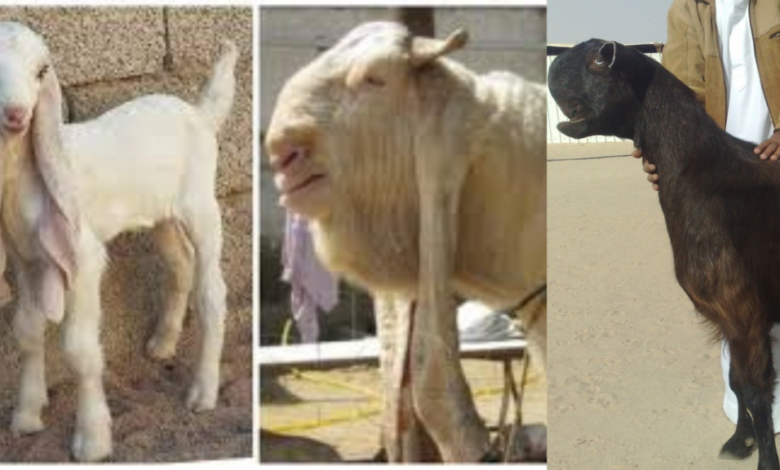Damascus Goat: Features, Cost & Unique Traits.

The Damascus goat, also known as the Shami goat, Aleppo goat, or Baladi goat, is a special breed known for its looks, strong genetic traits and high value. Originated from the Middle East, especially Syria and Lebanon, this goat has been bred for centuries for milk, meat and climate adaptability.
In this article, we will explore the features, cost and unique traits. We will also cover baby goats, skull structure, size comparison, height, price and origin so you can have all the information you need about this breed.
What is a Shami Goat?
The Damascus goat/Shami goat is a domestic breed known for its big size, long ears and head shape. The breed is recognized by its arched nose, strong muscular body and long hair. Through selective breeding, some goats develop extreme facial deformities making them a subject of fascination among animal breeders and livestock enthusiasts.
This breed has high value due to its excellent milk production, strong immunity and climate adaptability. It’s primarily raised in Lebanon, Syria, Jordan and other Middle Eastern countries but has gained international recognition for its unique genetic characteristics.
Origin and History of the Goat
This goat has a long history of thousands of years. It originated from the Middle East, especially Syria and Lebanon where it was bred by local farmers for milk and meat. The breed has been mentioned in historical texts and ancient paintings indicating its importance in Middle Eastern livestock farming.
These goats have been exported to Cyprus, Turkey and other countries where they are often crossbred with other goat breeds to improve milk production and climate adaptability. The breed gained worldwide attention due to its unique facial features thus its nickname the “monster goat”.
Physical Characteristics
The characteristics of that goat make it one of the most recognizable goat breeds in the world. Some of its notable features are:
1. Head & Skull Structure
- The goat skull is one of its most distinctive feature, often big, arched and elongated. Some goats develop deformed skulls due to genetic mutations and look almost alien-like.
- Their heads are often broad with convex profile which becomes more prominent as they grow older.
2. Body Size & Height
- The size comparison shows this breed is bigger than most domestic goats.
- Adult goats can reach 80-100 cm (31-39 inches) at the shoulder.
- They are muscular and well-built perfect for meat production.
3. Coat & Colors
- These goats have long, silky and dense coats to adapt to different climates.
- Brown, red, black and white are common colors with brown being the most dominant.
- Their coats change color as they grow older making them even more unique.
4. Ears & Horns
- They have long droopy ears sometimes up to 30 cm (12 inches) in length.
- Some are horned while others are polled (without horns).
- Their horns when present are curved and thick adding to their uniqueness.
Damascus Goat Baby: Birth & Growth
A goat baby is born normal but as they grow their features become more defined. Here are some facts about baby goats:
- Born weight of 2.5 – 3 kg (5.5 – 6.6 lbs).
- Facial features like arched nose and large ears become more visible within few weeks.
- Baby goats are very active and grow fast due to their strong genetics and high quality milk from their mothers.
- They reach full maturity within 12-18 months depending on diet and environment.

Price: How Much Does It Cost?
The price varies depending on age, gender, size and pedigree. Here is the price range:
Baby Damascus Goat
$300 – $700
Adult Female (Doe)
$1,000 – $2,500
Adult Male (Buck)
$1,500 – $3,500
Champion Bloodline
$5,000+
- Purebred goats from champion bloodline can go for over $5,000 in auctions and livestock exhibitions.
- Price is higher in countries where these goats are rare and highly in demand.
Why Are These Goats So Expensive?
The high price of these goats is due to:
- Unique Genetics – They are bred for strong immunity, high milk production and superior meat quality.
- Milk & Meat Production – This goat can produce up to 3 liters per day making them valuable for dairy farmers.
- Rarity & Demand – In many countries they are considered exotic making them more expensive.
- Breeding Challenges – Some goats develop extreme facial deformities so breeding requires expertise which adds to the cost.
Breeding & Farming
- These goats are very fertile, twins and triplets are common in a single birth.
- Farmers crossbreed them with other dairy breeds to increase milk production.
- Being hardy they can survive in hot and arid climates making them suitable for Middle Eastern and African farms.
Myths about Shami Goats
1. Are Shami Goats Born Deformed?
Not all Shami goats are deformed. The extreme facial deformities you see in some are because of selective breeding and genetic mutations. Many goats have normal faces.
2. Are They Only for Milk?
No, these goats are dual-purpose. Milk and meat.
3. Are They Aggressive?
Despite their size, these goats are friendly and gentle. Good for small and big farms.
Conclusion
Damascus goat is one of the coolest goat breeds in the world. Unique skull shape, big size, high milk production and adaptable. Expensive but worth it for breeders and farmers.
Whether you want to raise a kid, compare their size and height, or know their price and origin, this breed is popular among livestock enthusiasts worldwide.
1. What is a Damascus goat?
A Damascus goat is a Middle Eastern breed known for looks, milk and meat. Also called the Shami goat, it has large body, long ears and arched nose, one of the most recognized goat breeds in the world.
2. Why does the Damascus goat look like that?
The facial features of a goat, arched nose and broad skull are the result of selection. Some goats may develop extreme facial deformities which are desirable in some breeding competitions and livestock shows.
3. How much does a Damascus goat cost?
The price of a Damascus goat varies according to age, size and bloodline:
- Baby goat: $300 – $700
- Adult female (Doe): $1,000 – $2,500
- Adult male (Buck): $1,500 – $3,500
- Champion bloodline: Over $5,000
4. What does a Damascus goat eat?
These goats eat hay, grains, fresh grass and protein feed. They also eat vegetables, fruits and mineral supplements to keep them healthy and milking.
5. How tall can a Damascus goat grow?
A full grown Damascus goat can reach 80 to 100 cm (31 to 39 inches) at the shoulder, bigger than most domestic goat breeds.



